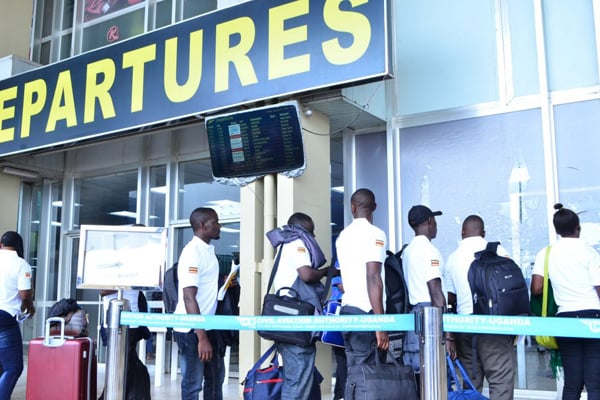
Ms Majorine Nsangi in Abu Dhabi, United Arab Emirates, where she worked as a housemaid for four years. PHOTO/COURTESY
|Special Reports
Prime
Maid in Middle East: I braved racism and punishing workload
What you need to know:
- In this first of a six-part series titled Maid in Middle East, Gabriel Buule caught up with Majorine Nsangi, who worked in Abu Dhabi for four years to fend for her son.
- The 26-year-old single mother had to develop a thick skin to make ends meet.
“Initially, I had hesitated to accept the idea of going to work in the Middle East as earlier suggested to me by my friend. Life was never easy in Uganda since I was a young single mother.
Through a WhatsApp conversation, my friend enticed me with life in the Middle East as she assured me that she was making money and it was not all bad as portrayed in the media. She suggested an agency that made my process swift. I was asked to find a passport, which was never an easy task.
Initially, I was referred to an agent, whom I paid Shs500,000. In the middle of the process, he referred me to a person at the passport office, who asked for extra Shs300,000. My passport was delivered in around seven days. That was in 2019.
Shs300,000 bribe
I had never stepped on an aircraft. I arrived at the airport with my agent, who briefed me on what to tell the Immigration officers. He also gave Shs300,000 to a person who gave it to an Immigration officer and I was never delayed. Actually, he gave the Shs300,000 to a woman in front of me in the queue and she gave the money at the Immigration point at the airport. When the officer looked at me, I was allowed to proceed.
I saw several girls who were destined for the Middle East, but they were turned down at Immigration points. Several kept weeping and others kept on making phone calls to their agents. Others were pleading with whoever they saw.
I got frustrated when—after my bag was ransacked at the scanning point—I was asked to surrender a few of my belongings. I had body jelly, toothpaste, perfumes and body lotion. All were confiscated.
Unlike my other friends who had told me they had travelled with other airlines where there were no meals and several layovers, my employer booked Emirates that took me straight from Entebbe to Dubai, United Arab Emirates. I remember a friend telling me that she used Fly Dubai, which kept stopping, and she had no money to buy her own meals. My experience was different. On the plane, I ate, watched a movie and the experience was indeed awesome.
My first KFC meal
We arrived in Dubai towards morning, and I found my employer carrying a photocopy of my WhatsApp profile photo with my name. He was a friendly man, who welcomed me with a smile and briefed me that he had to drive me to his home in Abu Dhabi—a three hours’ journey from Dubai by road.
ALSO READ: My life as a migrant worker in Saudi Arabia
Much as I thought we would use a plane, I had no choice and time to negotiate because, much as he could speak a few words in English, he struggled a lot to articulate himself. Along the way, my employer kept stopping to pray. He asked if I was hungry at one point, to which I responded affirmatively. And just like that, I had my first meal at KFC.
Basically, it was not a hustle for me just like what happens to many migrant workers who usually share their stories. However, I recall crying in the plane after thinking about my son given the fact that it would take me time to come back to Uganda and I really did not know what awaited me.
Settling in
I was received by a family that initially had three members. They indeed showed me love and that gave me hope that I was in the right place. Unfortunately, none could speak English. The boss, who could speak English, was ever absent. They would speak to me using gestures until months later when another family member who knew English arrived.
Family members multiplied and I started working for a family of 16 people.
I had to cook for the family, wash for everyone and take care of the house. Everyone would give orders and some orders would come in the middle of another assignment. I was also asked to start teaching their children English literacy since the children were no longer going to school. I had little choice but to accept.
In four years, I was able to buy myself a car. I also put up a small structure, which I hope to expand in the near future.
Calling it quits
The family liked me so much to the extent that they never wanted me to leave. I had to pretend that my mother, who died several years ago, had just passed away. I was tired and missed my son deeply.
So, after four years, I returned to Uganda in January 2023. During my time in Abu Dhabi, rest was at a premium. In most cases, I would not find time to sleep or rest since I would prepare several meals throughout the day and later wash utensils all night long. Cooking would come with several tasks since their spices are never readymade. I had to prepare cinnamon, lemon, chilli and other spices on a daily basis.
During Ramadan, family members would spend their day sleeping, receiving visitors. At night, they would eat forever and everyone would want to be served instead of serving themselves.
At one point, the head of family, who seemed like a clan leader, started defending me. Sadly, I would not explain my pain to him since he did not speak English.
I realised that the daughters-in-law had a soft spot for me. So I used them to convince the family to allow me to use the Internet.
Racism, tasks galore
I returned the favour by loving their chaotic children, who used to racially abuse me and were a general nuisance. Sometimes I would be mopping and their teenager would intentionally pour dirt in a place that had already been cleaned. No-one would castigate them.
When they realised that I could drive a car, they processed a permit for me and I was tasked to drive children to the school. I would also wash a fleet of cars in addition to watering flowers every day. With all those tasks on table, I struggled with back pain until they recruited another migrant worker, a Ugandan. She never adjusted to the situation and she left a month later.
Unlike those who complain about payment, I was paid every month. It was, however, always painful not to physically spend my money on my child. I would often cry on the phone whenever I could speak to him.
I never liked their food, but I was not there to eat. I also never liked the weather, the racism and verbal torture.”
Next week, Maid in Middle East will zoom in on the lived experiences of Ms Joan Nanono who left Uganda after nearly being raped by a deranged family member.
Giving back...Business idea
Because I used to find it hard to remotely take care of my son, I realised that most Ugandan migrant workers are single mothers with families back home. I realised that having endured the same pain, I would return home and take care of children of migrant workers at a fee.
Personally, I was traumatised by the fact that even those I would send to visit my child would not deliver as expected.
I realised that children must be entrusted with persons who are fully paid instead of family members and friends, who assume that they are extending favours.




